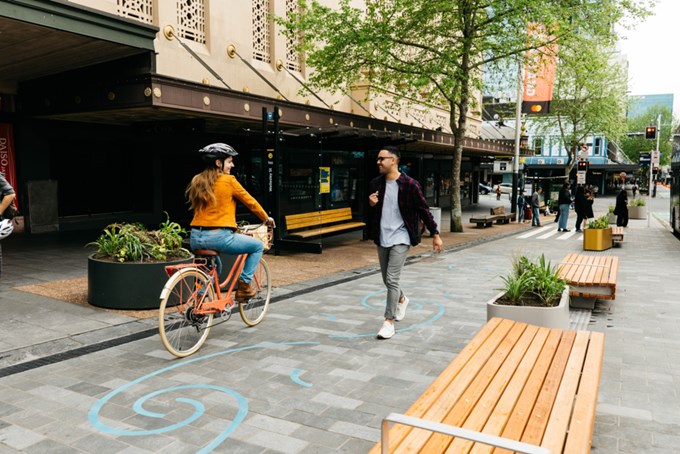The extent to which climate change impacts Tāmaki Makaurau hit home for many earlier this year. We have seen severe weather events like the Auckland Anniversary Floods and Cyclone Gabrielle show the devastating impacts of climate change – and the importance of climate action.
Te Tāruke-ā-Tāwhiri: Auckland’s Climate Plan is a long-term approach to climate action for the Auckland region. It sets out eight priority action areas to deliver our goals to reduce emissions and adapt to the impacts of climate change.
“Te Tāruke-ā-Tāwhiri sets out key priorities to deliver on climate action for Tāmaki Makaurau. It’s a blueprint for the region and, overall, I am proud of the progress we have achieved in so many areas despite the challenges we have faced with covid, budget constraints and extreme weather events,” says Councillor Richard Hills, Chair of the Planning, Environment and Parks Committee.
“However, there’s more work to be done particularly when it comes to emissions reduction. To halve our emissions by 2030, and reach net zero emissions by 2050, requires the council, its CCOs, the community, and our partners to increase commitments to climate action. We all must play our part.”
The progress report outlines the percentage of actions that are completed, on track, partially underway but require more work, or not in progress. It also provides highlights of progress and key challenges for each priority in the plan along with a summary of key initiatives planned for next year.
“It is important that we regularly monitor and report on Te Tāruke-ā-Tāwhiri to better understand our progress towards our main goals of reducing emissions and adapting to climate change impacts,” says Councillor Angela Dalton, Deputy Chair of the Planning, Environment and Parks Committee.
“This important mahi is ongoing but these annual updates allow us to identify trends and measure how well we are tracking to deliver long-term climate goals.”
What is in the report?
Auckland Council has different levels of responsibility and control over the actions in Te Tāruke-ā-Tāwhiri, which reflects the regional focus of the plan.
There are currently a similar number of actions “underway” and actions “not in progress”, compared to the September 2022 progress report. However, the proportion of actions completed has risen to 3 per cent vs 1 per cent in the previous report.
The September 2022/2023 progress report shows that we are well underway on our actions, stating that:
- 3 per cent of actions are complete.
- 31 per cent of actions are on track.
- 52 per cent are underway but require more work.
- 13 per cent are not in progress.
In the 2022/2023 year, the council made significant progress on climate action. This includes the start of various programmes and projects funded by the Climate Action Transport Targeted Rate.
This targeted rate saw more than $1 billion invested in new frequent bus routes, the procurement of new electric ferries, as well as further investment in walking, cycling and our urban ngahere.
The committee also heard key initiatives planned for 2023/24, including:
- Further engagement with mana whenua to discuss the delivery of Te Tāruke a Tāwhiri.
- The establishment of a Regional Leadership Group to accelerate climate action through collaboration and partnerships.
- The improvement of the climate action progress and monitoring framework to provide clearer understanding of progress on climate targets.
Working with mana whenua
Te Puāwaitanga ō te Tātai outlines te ao Māori principles that should be interwoven throughout the other priorities and are fundamental to the delivery of Te Tāruke-ā-Tāwhiri.
The Tāmaki Makaurau Mana Whenua Forum (previously the Mana Whenua Kaitiaki Forum), a collective of the 19 hapū and iwi authorities of Tāmaki Makaurau, worked closely with Auckland Council throughout the development of Te Tāruke-ā-Tāwhiri.
Over the past 12 months, Māori specialist staff have provided support to build knowledge and capability amongst staff working on Te Tāruke-ā-Tāwhiri in preparation for the next phase of delivery.
Progress on emissions
The delivery of Te Tāruke-ā-Tāwhiri and the progress of its actions impact on greenhouse gas emissions and the extent to which Auckland is impacted by climate change.
Despite the progress being made on climate action, Auckland’s emissions are not tracking in line with the target to reduce emissions by 50 per cent by 2030. Auckland’s current trajectory is still one of increasing emissions.
Meeting our targets set in Te Tāruke-ā-Tāwhiri, and meeting commitments to the Paris Agreement, is therefore becoming harder. This means the emissions curve is getting steeper and the interventions required are becoming more drastic.
Overall, from 2016 to 2019, gross and net emissions have increased by 647 kt CO2e (or 5.4 per cent for gross emissions, 6 per cent for net emissions).
Emissions were higher from energy, transport and industrial processes and process unit sectors, but lower from waste and agriculture sources.


